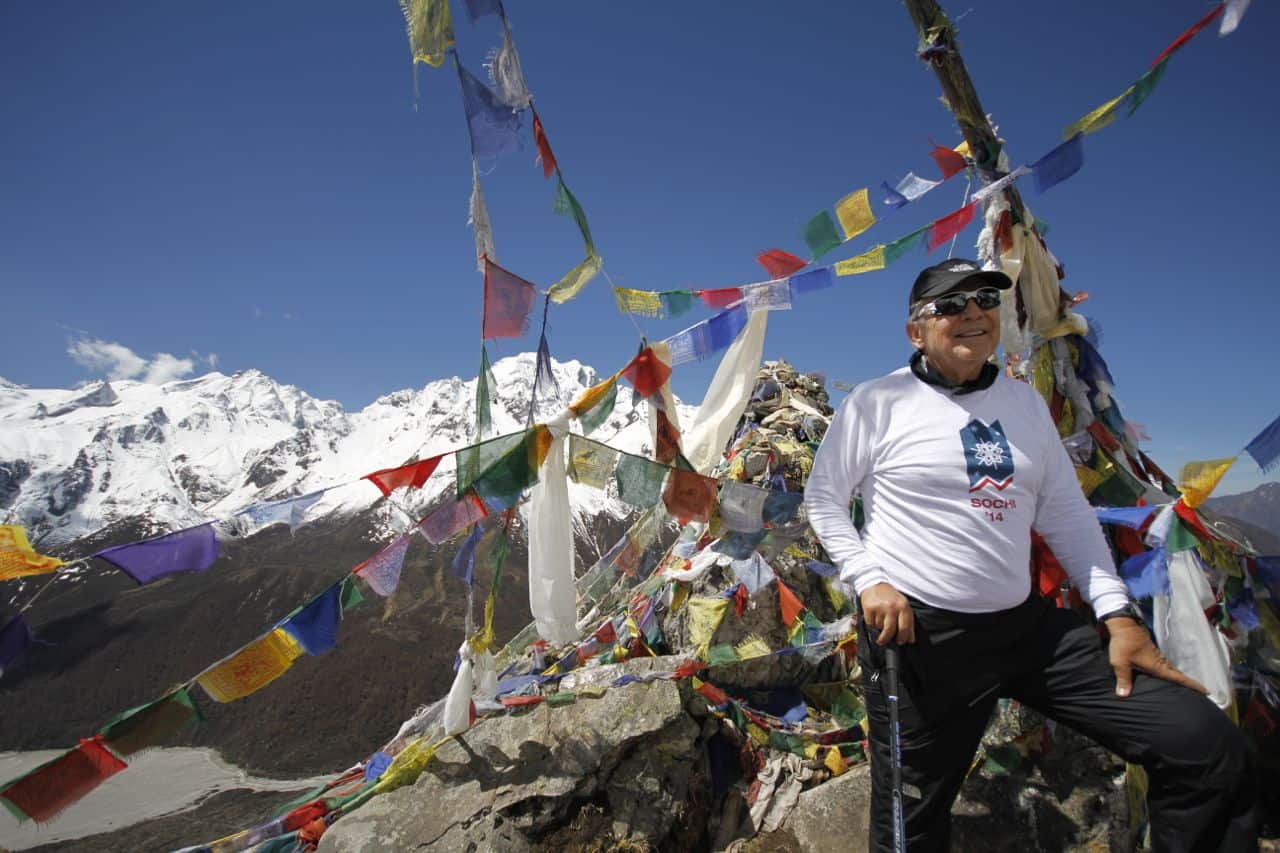Like any good Buddhist, Ed Marzec has lived many lives: He was a high-powered attorney in the U.S., he served multiple presidents, he taught at a university for more than a decade, he raised Andalusian horses, and he is proprietor of the Punta Mala nature reserve in Playa Hermosa, a significant breeding ground for sea turtles. He spends much of his time living and working in Costa Rica, and he has led conservation and service projects around the world.
But Marzec is now embarking on his most ambitious project yet: He will attempt to summit Mt. Everest, the tallest mountain the world. If he succeeds, 67-year-old Marzec will likely be the oldest U.S. citizen to bag the peak.
Among Marzec’s companions will be his friend Padam Ghale, a 72-year-old Nepalese mountaineer and guide. Marzec has endured six knee operations, but he is otherwise in good health. The Tico Times reached him by phone during his extended layover in Beijing, China.
First off, how are you feeling?
I’m feeling great. I’m in great physical shape. The blood count is up, so I can hold oxygen. Iron is high, which is good. All the body parts work. But that’s only one-third of the formula. It’s quite well known that physical wellbeing is just a prerequisite.
A lot of it is luck — avoiding avalanches, rocks falling from above, chunks of ice coming down, equipment failure. There’s instantaneous storms that crank 100-mile-an-hour winds. There’s high-altitude sickness and mental stability. When people climb, the normal death rate is about 10 or 12 percent. In my age group, the rate is about 40 percent. But I feel like I’m going to beat those odds.
What inspired you to take on Everest?
Let me start by saying that Buddhism is a great philosophy on life, and it is not an organized religion. It’s a philosophy. And if you become a great Buddhist, you become a wonderful Christian, a wonderful Jew, a wonderful Hindu, or whatever.
I was studying Buddhism in Kathmandu, because [the nearby city of] Lumbini is the birthplace of the Buddha, and not India, like many people think. The direct teachings of the Buddha come from Nepal. Buddhism is “whatever works,” basically. The Buddha said, as you try to find enlightenment, you must never take the easy road, which was the Buddha’s way of saying, “No pain, no gain.” So I thought, the highest mountain in the world is the one I’d try next.
So what’s the itinerary?
I flew into Beijing on China Airlines, because I have friends here. I’m going to spend some time in Bangkok for a business trip. Then I’ll be in Kathmandu, Nepal, probably on the 19th [of March]. I’ll be meeting with a number of Buddhists there to get my head squared away. Then I’ll be headed to the most dangerous airport in the world, Lukla. They say if you survive the flight to Lukla, the rest of it is a cakewalk.
Tell me about your team.
Usually [expeditions] are groups of five or 10 climbers, because that’s how they split it up. Unfortunately, I’m a very competitive person, and if someone goes ahead of me, I’ll want to keep up with them, and that could be fatal. I’ll have three climbers, then a head climber. I’ll have 12 porters, I’ll have a cook. But the last part of the journey will just be three or four of us.
You have a demonstrated interest in conservation, and Mt. Everest has become infamous for its litter. What are you feelings about it?
Although there are 300 permits issued each year, about 1,500 people pass through the base camp on a rotating basis. You have sherpas, you have support groups, you have families. There’s no power. There’s no sewage. There’s no water, except by melting ice. And you have huge amounts of trash buildup. A little pun here – it gets kind of shitty here after awhile. For everyone who gets a permit, a portion of the money goes to drums that take fecal matter down the mountain.
You live in Costa Rica about half the year. Are you representing the country in any way?
I love Costa Rica, I love the people in Costa Rica, and I’ve met some wonderful folks. I am taking up a Costa Rican flag, and when on the summit, I plan on holding it up – if I’m alive. (Laughs). It’s my humble way of saying thank you to the generosity Costa Rican people.
Some climbers attempt the mountain without oxygen. Do you plan to use oxygen?
Only 40 to 50 people have summited Everest without oxygen. This is something that’s dangerous enough using oxygen. And by the way, oxygen is a very dangerous chemical. Oxygen is tough on the lungs, tough on the system. It even burns the lungs after awhile. It’s like having a really bad hangover.
You have done a lot of service projects in diverse communities around the world. What should people know about service?
I’ve had a very fortunate life. I became a lawyer, I’m physically fit, I’m a tough guy – physically and socially. But I realized that all the houses and Ferraris that I had were absolutely worthless. It was like trying to swim across a very wide, deep river, and all these things that I had were like anchors that made crossing that river impossible.
None of these worldly things means anything. It’s totally contrary to our advancement. I’ve been able to not just give it away, but use my good fortune to help other people. That’s what the Buddha taught. It makes everything I do seem very natural.






